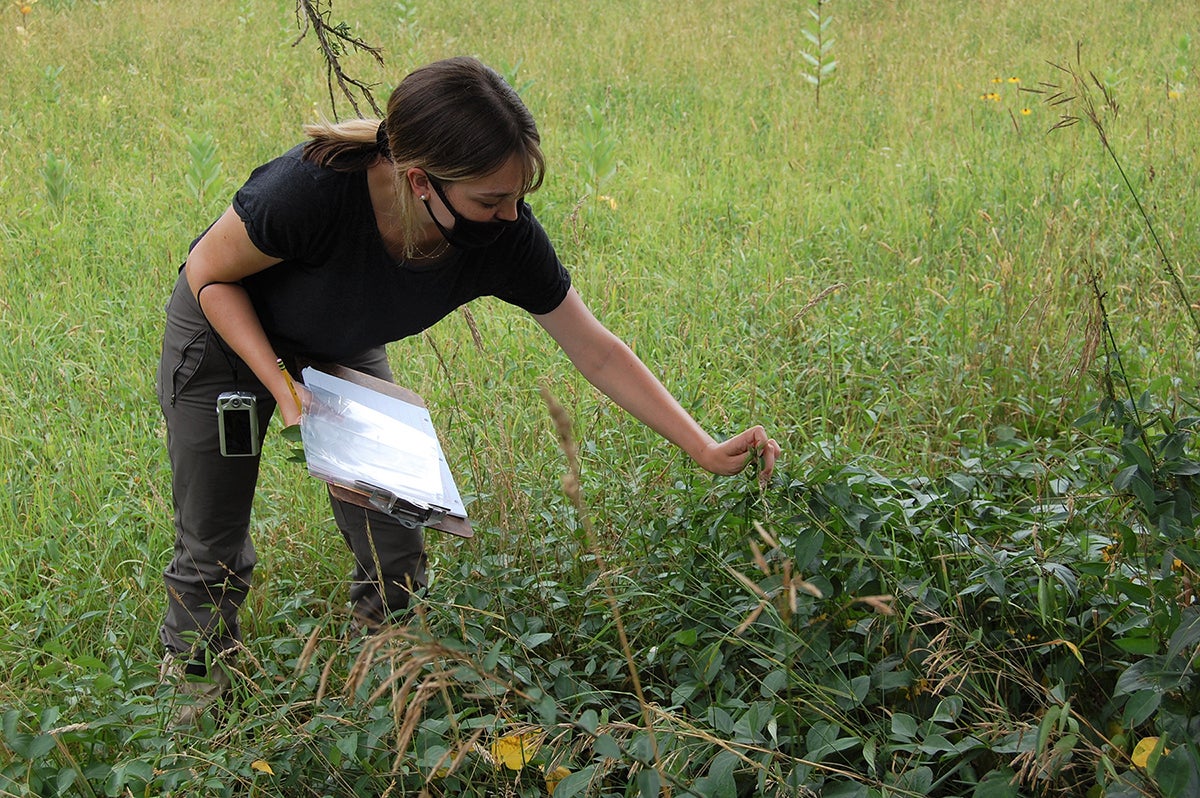KINGSTON, R.I. – July 29, 2020 – The biggest difference between Crystal Lavin’s four years in the U.S. Navy – mostly spent standing guard at a military base in Naples, Italy – and her summer research experience at the University of Rhode Island has been her attitude about asking questions.
“In the military, everything is pretty straightforward, and you don’t question anything. But now, being in the science field, I ask questions 24/7 and it’s encouraged,” said Lavin, a native of Virginia Beach, Virginia, who now lives in North Kingstown, Rhode Island. “This research project has been a totally new experience.”
A rising junior majoring in environmental science and management, Lavin is spending the summer studying a little-known pathogen that has been reported to kill an invasive plant called swallowwort, which takes over fields and outcompetes native plants. Swallowwort is also deadly to monarch butterfly caterpillars when adult monarchs mistake it for their preferred host plant, milkweed, and lay their eggs on the invader instead.
“The goal is to see if we can isolate the pathogen and then extract the DNA to identify it. To do this, I take samples from the field, bring them to the lab, and put them in moisture chambers and growth chambers to encourage the pathogen to grow,” she said,
“I’m also surveying different locations, looking for the pathogen to see whether it’s mostly found on swallowwort in sunny areas or shady areas or the edge of the forest.”
The pathogen is a kind of fungus that appears in several forms and was discovered in Rhode Island in 2018 and investigated last summer by fellow URI student Lexi Johnson. If it can be determined under what conditions it grows best, perhaps scientists can use it as a management tool against invasive swallowworts.
At South Farm Preserve in Charlestown, Lavin explored the property to collect samples, identify the areas where the pathogen was most prevalent, and note in what stage of growth it was found. She placed selected leaves in plastic bags, made notes about each sample, and returned them to the URI Biocontrol Lab for further study.
“We don’t know where the pathogen came from, but it has the potential to kill swallowwort, and that’s a good thing,” she said. “And it could aid in mitigating it.”
Lavin’s summer research is partially supported by the URI Coastal Fellows Program, a unique initiative designed to involve undergraduate students in addressing current environmental problems. Now in its 24th year, the program pairs students with a mentor and research staff to help them gain skills relevant to their academic major and future occupations.
“I love that the Coastal Fellows Program allows someone with little experience to jump into a job that is all experience,” she said. “I’m getting field experience, lab experience, and I’m even doing outreach with farmers. It’s one of the reasons why I chose this project. It’s 100 times better than standing post (in the Navy).”
But were it not for her military experience, she may not even be a Coastal Fellow. Her interest in studying environmental science was sparked while standing guard in Italy and observing a distant trash fire raining ash down around the area.
“It got me thinking about how it was affecting wildlife,” she said. “It triggered my interest in learning more about how we’re affecting our planet, our atmosphere and the overall environment and what we can do to reduce our impact.”
With two years to go before graduating from URI, Lavin isn’t sure yet what her future holds, but she enjoys the idea of working to restore degraded habitats.
“Working in the field on this project has got me interested in learning more about plant pathology, so maybe I’ll do something with plant science, too,” she said. “Maybe I’ll end up getting a graduate degree. I’ll cross that bridge when I get to it. I’m leaving my options open.”

